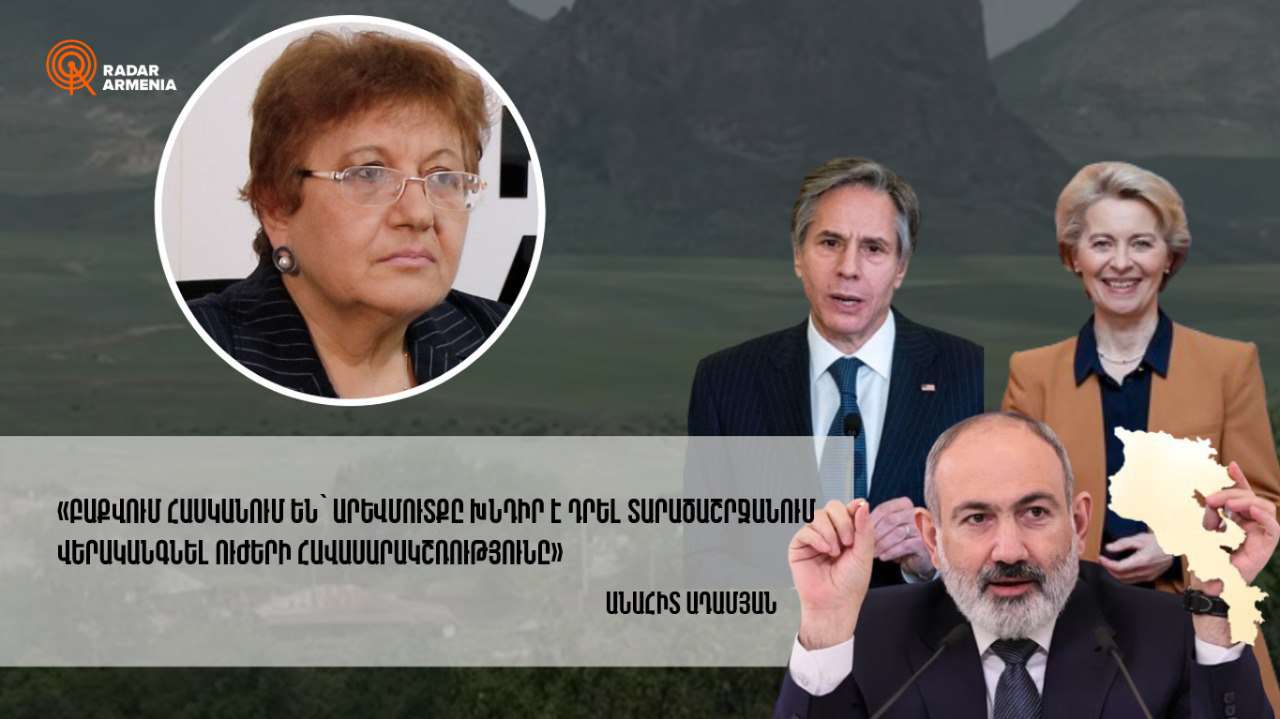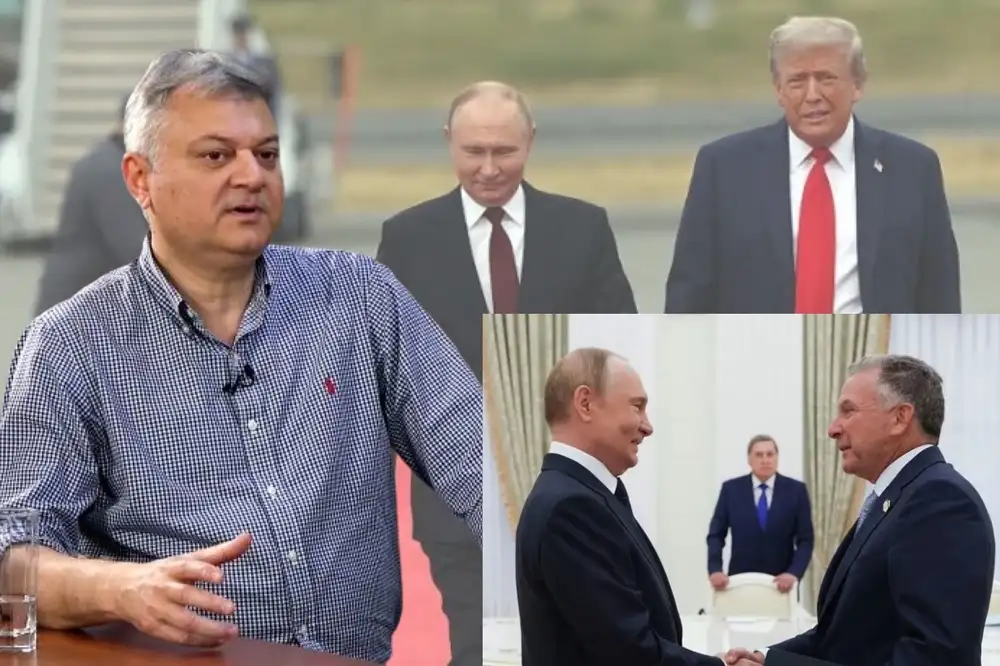Radar Armenia's interlocutor is Anahit Adamyan, a member of the political council of the "Republic" party.
- The issue of whether or not to return the 4 villages is being actively discussed in social and political circles. The government insists they are not among the 29,800 km²; the opposition considers it a one-sided concession. What problems do you see in this process? Is it the right approach adopted by Armenia to return those villages when Azerbaijan is not going to withdraw from the territories of Armenia?
- Surely, the problem is not the 4 villages at all; the question concerns the existence of Armenia as a sovereign state. Regarding demarcation and delimitation, the "Republic" favors solving the issue according to the principles of the quadripartite declaration adopted in Prague. As a result of the Pashinyan-Aliev-Macron-Michel quadrilateral meeting in Prague on October 6, 2022, a statement was adopted, according to which Armenia and Azerbaijan confirm their commitment to the UN Charter and the Alma-Ata Declaration of 1991, through which both sides recognize each other's territorial integrity and sovereignty. Quote: "They confirmed that this will be the basis for the work of the commissions on demarcation issues, and the next session of these commissions will be held in Brussels by the end of October. Armenia expressed its agreement to encourage the EU civilian mission along the border with Azerbaijan. Azerbaijan agreed to cooperate with the mission to the extent that it would be relevant. The mission will start in October and last for two months. The purpose of the mission will be to build confidence and support the border commissions through its reports."
The question arises: why did the delimitation commissions start bilateral meetings without Brussels? Why was the EU civilian mission deprived of the opportunity to support border commissions? Today, it is a fact that the work of demarcation commissions in a bilateral format has failed. It is evident from the beginning that in the bilateral format, Azerbaijan has Russia and Turkey behind it, and Armenia is alone.
In 2020, the "Republic" party announced that the cease-fire should not be trilateral but five-partite, including the OSCE Minsk Group, which co-chairs the USA and France. In that case, the events would have had a completely different development, and only Russian peacekeepers would not have appeared in Artsakh (at least US President Donald Trump proposed the deployment of Scandinavian peacekeepers); as a result, Artsakh would not have been depopulated. In all subsequent processes, the internationalization of issues was essential to ensuring the withdrawal of Armenia from the toxic triangle of Russia-Azerbaijan-Turkey, where decisions cannot be made in the interests of either Artsakh or Armenia because those countries have their own shared interests that do not coincide with the interests of Armenia.
Now, the problem with RA should be to implement the delimitation only after accepting the fundamental principles of Prague. Without recognizing mutual territorial integrity, delimitation will prevent new wars and may lead to new aggressions and wars. The recognition of each other's territorial integrity means the return of the occupied Armenian territories. Armenia and Azerbaijan are not the first countries to implement border demarcation. There is an international experience that establishes specific rules of demarcation, i.e., the division of vital roads, oil pipelines, gas pipelines, livelihoods of the inhabitants of the area, grasslands, pastures, and other factors, in such a way that it is long-lasting and does not cause further conflicts. It is evident that Azerbaijan does not vitally need its former 4 villages but aims to influence the internal political situation of Armenia by immediately demanding border delimitation processes, accelerating as much as possible the supposed change of power and the coming to power of such forces in Armenia that will hand over both the Meghri Corridor and 4 villages and all areas. In other words, the goal is the dismemberment of Armenia and the abolition of sovereignty. Armenia can face these challenges only with the support of the West; there is no alternative, and there is no time left.
- The meeting of Armenian Prime Minister Nikol Pashinyan, European Commission President Ursula von der Leyen, and US Secretary of State Anthony Blinken will take place in Brussels on April 5, during which the ways of tripartite cooperation contributing to the development of Armenia will be discussed. What can we expect on April 5? What message does the fact of the meeting convey to Azerbaijan when the main point of the US-Armenia-EU meeting is economic stability?
- The meeting scheduled for April 5 in Brussels has an unprecedented format: the US State Department and the European Commission, i.e., the executive authorities, are together. This is a critical nuance. Even more so after the famous resolution of the European Parliament and before the presidential elections in the USA. What can we expect from Brussels? It is easy to conclude that if the US and the EU have planned such a meeting, they have clear proposals and a specific road map to accomplish. Question: What kind of package does RA go to the meeting with? Undoubtedly, the core of the meeting should be strengthening Armenia's sovereignty. 1. The Prime Minister of the Republic of Armenia must apply for EU membership in Brussels. 2. The Prime Minister of Armenia should have another meeting in Brussels with NATO Secretary General Jens Stoltenberg to prepare a deeper cooperation agreement. 3. The RA Prime Minister should have a package of proposals for establishing regional security and, at the same time, proposals for signing military-political agreements with the US and EU member states (after France, Greece, Cyprus, and Poland) to ensure its defense capability, the acquisition of modern weapons, before NATO membership. And training and reorganization of the RA National Army with NATO standards and military art. 4. The prime minister of RA should have a regional economic development package with detailed mechanisms for opportunities to include Armenia in international economic programs. Armenia should have new agreements on deepening trade and economic relations with the USA and the EU, enabling it to exit the EAEU through transit, providing markets for the consumption of Armenian products, and restructuring production for products that meet international standards, involving new technologies and investments. After Brussels, Armenia should start the process of officially withdrawing from the CSTO. After the tripartite meeting in Brussels, if the entire agenda is successfully agreed upon and the road map starts working, Azerbaijan will be interested in signing a peace agreement with Armenia, despite Russia's intense resistance and threats. The agreement will work because it will have guarantees and guarantors, and when Azerbaijan has Turkey and Russia behind it, the USA and the EU will be behind Armenia. It will not make Armenia another field of geopolitical confrontation, but it will make it resistant and capable of defense.
Naturally, there have already been statements from Azerbaijan and Russia that copy each other and accuse the USA and the EU of taking a biased position and escalating the situation in the region. These statements are not entirely unexpected because Baku, which refuses Western platforms and practically boycotts the peace agreement, understands that the West has set a task to restore the balance of power in the region, i.e., to increase the military and economic security and resilience of Armenia, after which Azerbaijan will strive for peace and stability. Note also that in case of possible military aggression, Azerbaijan, having the support of Turkey at the level of public policy, will no longer be an ally with Turkey, which was the real winner in the 2020 war with the active support of Russia. Turkey's economy is not in a condition for Recep Tayyip Erdogan to continue the policy of making war all around. To avoid default, Turkey is making an original return to the West and again relying on the prospects of EU membership. It is no coincidence that Turkey has recently stopped talking about the "Zangezur Corridor" and declared that it supports peace in the region. In this case, at some point, Azerbaijan will stop fulfilling the Russian instructions, which contradicts its interests, because there are economic problems in Azerbaijan as well. Like the Turkish lira, the Azerbaijani manat is also in endless decline; warring Russia cannot do anything, and finance and technology are in the West. Therefore, Baku can no longer continue the tightrope between the West and Russia. At some point, they will force a choice on both sides.
Hayk Magoyan


















